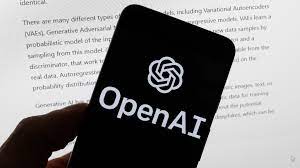The FTC Investigates OpenAI: Analyzing The Potential Fallout

Table of Contents
The Nature of the FTC's Investigation
The FTC's investigation into OpenAI stems from growing concerns about the ethical and legal ramifications of powerful AI technologies. The investigation centers on several key areas, reflecting broader anxieties about the responsible development and deployment of AI. The FTC is likely examining OpenAI's practices related to data privacy, potential biases embedded in its models, and the transparency of its data collection and model training processes. These concerns are not unique to OpenAI; they represent a larger challenge facing the entire AI industry as it grapples with the societal impact of increasingly sophisticated AI systems.
- Data privacy violations: The FTC is likely investigating whether OpenAI's collection and use of user data for training its AI models comply with existing data privacy regulations. Concerns exist regarding the extent of user consent obtained and the potential for unauthorized data usage.
- Algorithmic bias: AI models are trained on vast datasets, and if these datasets reflect existing societal biases, the models can perpetuate and even amplify those biases. The FTC may be assessing whether OpenAI's models exhibit harmful biases and what steps the company has taken to mitigate them.
- Lack of transparency: Critics argue that OpenAI lacks sufficient transparency regarding its data collection methods and the inner workings of its AI models. This lack of transparency makes it difficult to assess the potential risks and harms associated with the technology.
- Potential for misuse: The powerful capabilities of OpenAI's models raise concerns about their potential for misuse in applications such as generating disinformation, creating deepfakes, or automating harmful activities. The FTC's investigation may be exploring how OpenAI is addressing these potential risks.
Potential Consequences for OpenAI
The FTC investigation could have severe consequences for OpenAI. The potential penalties range from substantial financial fines to restrictions on data usage and significant changes to its business practices. Beyond the legal ramifications, the investigation could severely damage OpenAI's reputation and erode consumer trust in its technology. Furthermore, the investigation could trigger legal action from individuals or businesses who believe they have been harmed by OpenAI's practices.
- Financial penalties: Significant fines could severely impact OpenAI's financial stability and its ability to continue its research and development efforts.
- Reputational damage: Negative publicity surrounding the investigation could tarnish OpenAI's brand image and make it harder to attract investors, partners, and talented employees.
- Operational changes: The FTC might mandate changes to OpenAI's data handling practices, requiring more stringent data security measures and greater transparency in its operations.
- Increased regulatory scrutiny: The investigation could lead to increased regulatory oversight of OpenAI and the broader AI industry, creating a more challenging environment for AI development.
Broader Implications for the AI Industry
The FTC's investigation into OpenAI has far-reaching implications for the entire AI industry. It signals a potential shift towards increased regulatory scrutiny of AI technologies and could prompt other AI companies to review and adjust their own data practices and ethical considerations. The investigation could accelerate the development of industry-wide standards and ethical guidelines for AI development, prompting a much-needed conversation around responsible AI innovation.
- Increased regulation: The investigation could pave the way for stricter regulations on AI development and deployment, potentially impacting the speed and direction of AI innovation.
- Ethical AI development: The investigation highlights the importance of integrating ethical considerations into every stage of AI development, from data collection to model deployment.
- Investor confidence: The outcome of the investigation will likely influence investor confidence in the AI sector, potentially affecting funding for AI startups and research initiatives.
- Industry self-regulation: The AI industry may respond to the investigation by strengthening its own self-regulatory mechanisms and developing industry-wide ethical guidelines.
The Future of AI Development and Regulation
The FTC's investigation into OpenAI marks a crucial turning point for AI development and regulation. The long-term effects will depend on the outcome of the investigation and the subsequent actions taken by regulators and the AI industry itself. The investigation underscores the urgent need for a comprehensive legal framework that balances the need to foster innovation with the imperative to mitigate the risks associated with powerful AI technologies. International cooperation will be essential in establishing global standards for AI governance.
- Comprehensive legal framework: The investigation highlights the need for a clear and comprehensive legal framework governing AI development and deployment, addressing issues of data privacy, algorithmic bias, and potential misuse.
- Innovation vs. risk mitigation: Policymakers face the challenge of balancing the need to foster AI innovation with the need to protect individuals and society from potential harms.
- International collaboration: Effective AI regulation requires international collaboration to establish common standards and address the global implications of AI technology.
- Responsible AI development: The future of AI depends on a commitment to responsible AI development, prioritizing ethical considerations and ensuring that AI technologies are used for the benefit of humanity.
Conclusion
The FTC's investigation into OpenAI is a pivotal moment for the AI industry. The potential consequences for OpenAI—financial penalties, reputational damage, and operational changes—are significant. However, the broader implications extend far beyond a single company, potentially reshaping the regulatory landscape and influencing the future direction of AI development. The investigation underscores the urgent need for increased ethical considerations in AI development and the importance of a robust regulatory framework. Staying informed about this case and engaging in discussions about responsible AI development is crucial. Continue to follow the developments in the FTC Investigates OpenAI saga to understand the shaping of the future of artificial intelligence.

Featured Posts
-
 Unlocking Ai And Automation Potential Orchestration At Camunda Con 2025 Amsterdam
May 24, 2025
Unlocking Ai And Automation Potential Orchestration At Camunda Con 2025 Amsterdam
May 24, 2025 -
 Activision Blizzard Acquisition Ftcs Appeal Explained
May 24, 2025
Activision Blizzard Acquisition Ftcs Appeal Explained
May 24, 2025 -
 Serious M56 Motorway Collision Car Overturn And Casualty Treatment
May 24, 2025
Serious M56 Motorway Collision Car Overturn And Casualty Treatment
May 24, 2025 -
 Philips Future Health Index 2025 A Call To Action On Ai In Healthcare
May 24, 2025
Philips Future Health Index 2025 A Call To Action On Ai In Healthcare
May 24, 2025 -
 Actress Mia Farrow Demands Trumps Imprisonment Regarding Venezuelan Deportations
May 24, 2025
Actress Mia Farrow Demands Trumps Imprisonment Regarding Venezuelan Deportations
May 24, 2025
Latest Posts
-
 Co Hosts Of Today Show Address Long Term Anchor Absence
May 24, 2025
Co Hosts Of Today Show Address Long Term Anchor Absence
May 24, 2025 -
 Concerned Co Hosts Address Popular Today Show Anchors Absence
May 24, 2025
Concerned Co Hosts Address Popular Today Show Anchors Absence
May 24, 2025 -
 Today Show Anchors Absence A Message From Her Co Hosts
May 24, 2025
Today Show Anchors Absence A Message From Her Co Hosts
May 24, 2025 -
 Explanation For Anchors Absence From Today Show Co Hosts Speak Out
May 24, 2025
Explanation For Anchors Absence From Today Show Co Hosts Speak Out
May 24, 2025 -
 Today Show Co Hosts Reveal Concerns During Anchors Absence
May 24, 2025
Today Show Co Hosts Reveal Concerns During Anchors Absence
May 24, 2025
